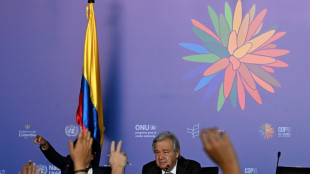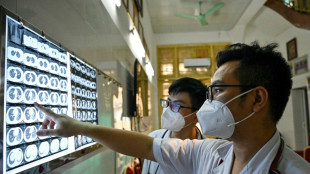
-
 Georgia president refuses prosecutors' summons after alleging vote-rigging
Georgia president refuses prosecutors' summons after alleging vote-rigging
-
First case of latest mpox variant detected in UK: health authority

-
 I'll be backing Harris: Schwarzenegger endorses Democratic ticket
I'll be backing Harris: Schwarzenegger endorses Democratic ticket
-
Stocks diverge, bitcoin close to record high

-
 Harris fends off 'garbage' fallout, Trump pushes 'cheating' claims
Harris fends off 'garbage' fallout, Trump pushes 'cheating' claims
-
'Peace among ourselves' crucial to save nature: UN chief

-
 French court acquits man who killed incurably ill wife
French court acquits man who killed incurably ill wife
-
New Hezbollah chief open to truce with Israel if offer is made

-
 Brazil trial begins over murder of iconic activist Franco
Brazil trial begins over murder of iconic activist Franco
-
Russia eats away at territory, and Ukrainian morale

-
 Trump's election fraud claims raise alarms of 2020 repeat
Trump's election fraud claims raise alarms of 2020 repeat
-
Spain races to save victims as floods kill 72

-
 UK's Labour govt hikes taxes in first budget
UK's Labour govt hikes taxes in first budget
-
Medvedev loses to Australian Popyrin at Paris Masters

-
 Germany dodges recession but inflation rises sharply
Germany dodges recession but inflation rises sharply
-
Harris seeks distance from Biden 'garbage' comments

-
 Spain races to save victims as floods kill 64
Spain races to save victims as floods kill 64
-
Riyadh Air orders 60 Airbus planes

-
 US economic growth solid despite slight slowdown as election nears
US economic growth solid despite slight slowdown as election nears
-
Eurozone economy grows more than expected

-
 UBS smashes forecasts with $1.4 bn net profit
UBS smashes forecasts with $1.4 bn net profit
-
Chinese EV giant BYD beats Tesla in quarterly revenue for first time

-
 US economic growth solid but below expectations as election nears
US economic growth solid but below expectations as election nears
-
Jurgen Klopp to target player welfare in Red Bull role

-
 Volkswagen sees 'painful' cost cuts ahead as profit plunges
Volkswagen sees 'painful' cost cuts ahead as profit plunges
-
Spain races to save victims as floods kill 62

-
 Tuberculosis cases hit record high: WHO
Tuberculosis cases hit record high: WHO
-
Bangladesh stumble to 38-4 in reply to mammoth South Africa total

-
 Volcanoes 'hidden source' of CO2 in past climate change: study
Volcanoes 'hidden source' of CO2 in past climate change: study
-
Stocks falter, bitcoin close to record high

-
 Eurozone economy grows faster than expected
Eurozone economy grows faster than expected
-
Mediators to propose Gaza truce amid deadly Israeli strikes

-
 China's Hisense first sponsor of new Club World Cup
China's Hisense first sponsor of new Club World Cup
-
Georgia prosecutors probe alleged election 'falsification'

-
 New Zealand's Ajaz 'emotional' on Mumbai return after perfect 10
New Zealand's Ajaz 'emotional' on Mumbai return after perfect 10
-
Germany dodges recession, posts surprise growth on spending boost

-
 Trump, Harris in frantic campaign push as US election nears
Trump, Harris in frantic campaign push as US election nears
-
De Zorzi out for 177 as S. Africa power to 527-6 against Bangladesh

-
 Worries for Japan economy after election shock
Worries for Japan economy after election shock
-
Israel short on soldiers after year of war

-
 Volkswagen profit plunges on high costs, Chinese slump
Volkswagen profit plunges on high costs, Chinese slump
-
De Zorzi out for 177 as S.Africa power to 413-5 against Bangladesh

-
 'CEO of supercute': Hello Kitty turns 50
'CEO of supercute': Hello Kitty turns 50
-
Australia head coach McDonald handed new deal until 2027

-
 Visual artist grabs 'decisive moment' to nurture Chad art scene
Visual artist grabs 'decisive moment' to nurture Chad art scene
-
Industrial slump leaves Germany on brink of recession

-
 'I'm terrified': French auteur Audiard hits Oscars trail for 'Emilia Perez'
'I'm terrified': French auteur Audiard hits Oscars trail for 'Emilia Perez'
-
New Indonesia defence chief harks back to dictator's rule

-
 In Tennessee, the despair of gun control advocates
In Tennessee, the despair of gun control advocates
-
US economy's solid growth unlikely to register at ballot box


Germany dodges recession but inflation rises sharply
Germany dodged a technical recession after posting surprise growth in the third quarter, official data showed Wednesday, but the rare good news for Europe's largest economy was tempered by a sharp uptick in inflation.
German gross domestic product expanded 0.2 percent quarter-on-quarter, federal statistics office Destatis said in preliminary data, thanks to higher government spending and household consumption.
The figure defied expectations, and the government of Chancellor Olaf Scholz had braced for another slight drop in GDP after output already fell in the second quarter.
Economy Minister Robert Habeck said the quarter-on-quarter expansion was a "ray of hope" for the German economy, which has been battered in recent years by high energy costs, cooling exports and increased Chinese competition.
"The economy is proving more robust than previously forecast and the technical recession expected by many has not materialised," Habeck was quoted as saying by German media.
A technical recession is defined as two consecutive quarters of contraction.
Germany's performance helped lift the wider eurozone economy, which on Wednesday reported forecast-beating growth of 0.4 percent over the July-September period.
LBBW analyst Elmar Voelker said although it was "too early to speak of a positive trend reversal" for Germany, it was "encouraging that private consumption is showing the first signs of recovery".
The news for Germany wasn't all good however as Destatis revised downwards its figure for the second quarter, saying GDP shrank by 0.3 percent instead of the previous estimate of a 0.1-percent decline.
German inflation also sprang a negative surprise, climbing back up to two percent in October after falling to a more than three-year-low of 1.6 percent in September.
The uptick "shows that inflationary pressure in Germany is still very much alive and kicking," said ING economist Carsten Brzeski.
- Manufacturing slump -
The headwinds plaguing the German economy, particularly surging energy costs due to Russia's war in Ukraine, have taken a heavy toll on the country's crucial industrial sector.
Nowhere has the manufacturing downturn been more visible than in Germany's flagship auto sector.
Europe's biggest carmaker Volkswagen reported a sharp fall in third-quarter net profits Wednesday and warned of an "urgent need" to cut costs to boost its competitiveness.
Volkswagen is considering closing at least three German plants and slashing tens of thousands of jobs, labour leaders told employees this week, as the company confronts stiff Chinese competition especially in electric vehicles.
Volkswagen, BMW and Mercedes-Benz all lowered their annual outlook in September, citing falling Chinese demand.
- Government under pressure -
Long-standing structural challenges have deepened Germany's woes, including complex bureaucracy, under-investment in infrastructure, an ageing workforce and a costly green energy transition.
Pressure has mounted on Scholz to take action, but his fragile three-party coalition is at odds over how best to turn the economic tide.
Habeck, from the Greens party, last week proposed a multi-billion-euro investment bonanza to help German business, but the idea was shot down by hawkish Finance Minister Christian Lindner from the liberal FDP.
Lindner is a staunch defender of Germany's constitutionally enshrined debt limits and has resisted calls from other coalition members to loosen the rules.
The International Monetary Fund has waded into the debate, with its European head Alfred Kammer on Tuesday saying Germany needed structural reforms as well as public infrastructure investments.
To achieve this, he told the Sueddeutsche newspaper, "the debt brake can be relaxed".
Germany was the only major advanced economy to shrink in 2023 and the government has previously said it expects another mild contraction in 2024.
But it now sees a recovery starting in 2025, when easing inflation and higher wages are expected to further bolster consumption.
O.Karlsson--AMWN